
Ürümqi, formerly known as Dihua, is the capital of the Xinjiang Uyghur Autonomous Region in the far northwest of the People's Republic of China. Ürümqi developed its reputation as a leading cultural and commercial center during the Qing dynasty in the 19th century.

Rebiya Kadeer is an ethnic Uyghur businesswoman and political activist. Born in Altay City, Xinjiang, Kadeer became a millionaire in the 1980s through her real estate holdings and ownership of a multinational conglomerate. Kadeer held various positions in the National People's Congress in Beijing and other political institutions before being arrested in 1999 for, according to Chinese state media, sending confidential internal reference reports to her husband, who worked in the United States as a pro-East Turkistan independence broadcaster. After she fled to the United States in 2005 on compassionate release, Kadeer assumed leadership positions in overseas Uyghur organizations such as the World Uyghur Congress.
Xinjiang Networking Transmission Limited, also known as Xinjiang Broadcast Network, consists of media broadcasting to Ürümqi and the Xinjiang province area. It operates the Urumqi People's Broadcasting Station and the Xinjiang People's Broadcasting Station, broadcasting in the Mandarin (dialect), Uyghur (dialect), Kazakh, Kyrgyz and Mongolian languages.

On February 25, 1997, 3 bombs exploded on 3 buses in Ürümqi, Xinjiang, China. 9 people were killed, including at least 3 children, and a further 28 were injured. Another 2 devices in the south railway station failed to explode. Steel balls, screws, and nails were found in the bombs.
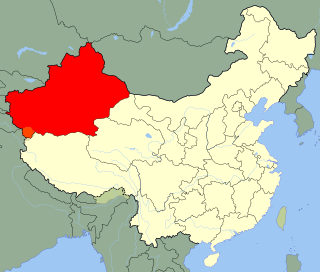
The 2008 Uyghur unrest is a loose name for incidents of communal violence by Uyghur people in Hotan and Qaraqash county of Western China, with incidents in March, April, and August 2008. The protests were spurred by the death in police custody of Mutallip Hajim.
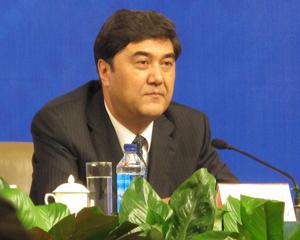
Nur Bekri is a former Chinese politician of Uyghur ethnicity, best known for his term as Chairman of the Xinjiang Uyghur Autonomous Region, between 2008 and 2014. Between 2014 and 2018, he was vice-chairman of the National Development and Reform Commission and Director of the National Energy Administration, with rank equivalent of a minister. Bekri was one of the highest ranked ethnic minority officials in the Chinese government.
The July 2009 Ürümqi riots were a series of violent riots over several days that broke out on 5 July 2009 in Ürümqi, the capital city of the Xinjiang Uyghur Autonomous Region (XUAR), in northwestern China. The first day's rioting, which involved at least 1,000 Uyghurs, began as a protest, but escalated into violent attacks that mainly targeted Han people. A total of 197 people died, most of whom were Han people or non-Muslim minorities, with 1,721 others injured and many vehicles and buildings destroyed. Many Uyghurs disappeared during wide-scale police sweeps in the days following the riots; Human Rights Watch (HRW) documented 43 cases and said figures for real disappearances were likely to be much higher.
The Shaoguan incident was a civil disturbance which took place overnight on 25/26 June 2009 in Guangdong, China. A violent dispute erupted between migrant Uyghurs and Han Chinese workers at a toy factory in Shaoguan as a result of false allegations of the sexual assault of a Han Chinese woman. Groups of Han Chinese set upon Uyghur co-workers, leading to at least two Uyghurs being violently killed by angry Han Chinese men, and some 118 people injured, most of them Uyghurs.

Xinjiang, officially the Xinjiang Uygur Autonomous Region (XUAR), is an autonomous region of the People's Republic of China (PRC), located in the northwest of the country at the crossroads of Central Asia and East Asia. Being the largest province-level division of China by area and the 8th-largest country subdivision in the world, Xinjiang spans over 1.6 million square kilometres (620,000 sq mi) and has about 25 million inhabitants. Xinjiang borders the countries of Mongolia, Russia, Kazakhstan, Kyrgyzstan, Tajikistan, Afghanistan, Pakistan and India. The rugged Karakoram, Kunlun and Tian Shan mountain ranges occupy much of Xinjiang's borders, as well as its western and southern regions. The Aksai Chin and Trans-Karakoram Tract regions, both administered by China, are claimed by India. Xinjiang also borders the Tibet Autonomous Region and the provinces of Gansu and Qinghai. The most well-known route of the historic Silk Road ran through the territory from the east to its northwestern border.

Ürümqi South railway station is a railway station of the Lanzhou–Xinjiang, Northern Xinjiang and the Second Ürümqi–Jinghe railways. The station is located in Ürümqi, Xinjiang Uyghur Autonomous Region, China. The name of the station was Ürümqi railway station from 1962 until September 1, 2014. This name is now assigned to the newly built high-speed railway station of the Lanzhou–Ürümqi High-Speed Railway.

The 2010 Aksu bombing was a bombing in Aksu, Xinjiang, People's Republic of China that resulted in at least seven deaths and fourteen injuries when a Uyghur man detonated explosives in a crowd of police and paramilitary guards at about 10:30 on 19 August, using a three-wheeled vehicle. The assailant targeted police officers in the area, and most of the victims were also Uyghurs. Xinhua news agency reported that six people were involved in the attack, and two had died; the other four were detained by police.
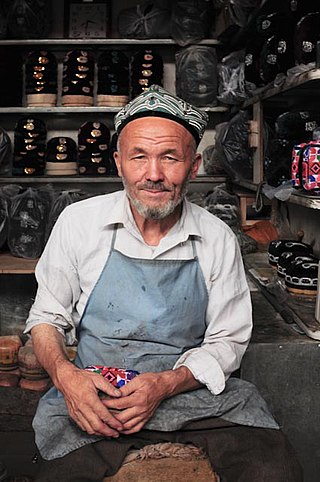
Uyghur Doppa Cultural Festival, is an internationally celebrated Uyghur cultural festival which is observed on May 5 annually since 2009.

Tianjin Airlines Flight 7554 was a scheduled passenger flight between Hotan and Ürümqi in China's Xinjiang Autonomous Region. The aircraft operating this route on 29 June 2012, an Embraer 190, took off from Hotan at 12:25 pm; within ten minutes, six ethnic Uyghur men, one of whom allegedly professed his motivation as jihad, announced their intent to hijack the aircraft, according to multiple witnesses. In response, passengers and crew resisted and successfully restrained the hijackers, who were armed with aluminium crutches and explosives.
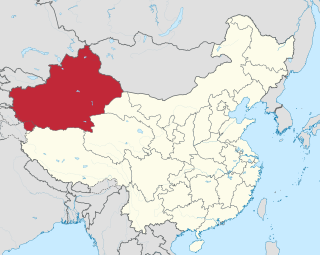
The Xinjiang conflict, also known as the East Turkistan conflict, Uyghur–Chinese conflict or Sino-East Turkistan conflict, is an ongoing ethnic geopolitical conflict in what is now China's far-northwest autonomous region of Xinjiang also known as East Turkistan. It is centred around the Uyghurs, a Turkic ethnic group who constitute a plurality of the region's population.

On 30 April 2014, a bomb-and-knife attack occurred in the Chinese city of Ürümqi, Xinjiang. The terrorist attack killed 3 people, and injured 79 others. The attack coincided with the conclusion of a visit by Xi Jinping, General Secretary of the Chinese Communist Party to the region.
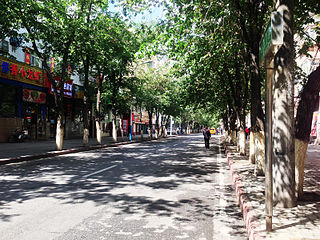
On the morning of 22 May 2014, two sport utility vehicles (SUVs) carrying five assailants were driven into a busy street market in Ürümqi, the capital of China's Xinjiang Uyghur Autonomous Region. Up to a dozen explosives were thrown at shoppers from the windows of the SUVs. The SUVs crashed into shoppers, then collided with each other and exploded. 43 people were killed, including 4 of the assailants, and more than 90 wounded, making this the deadliest attack of the Xinjiang conflict. The event was designated as a terrorist attack.
On the early morning of Wednesday, 30 July 2014, Juma Tahir, the imam of China's largest mosque, the Id Kah Mosque in northwestern Kashgar, was stabbed to death by three young male Uyghur extremists. Religious leaders across denominations condemned the attack.
Xinjiang People's Broadcasting Station (XJBS) was a radio station broadcasting to the Xinjiang province area. It was operated by the Xinjiang Networking Transmission Limited in Mandarin, Uyghur, Kazakh, Kyrgyz and Mongolian languages. Founded as Dihua People's Broadcasting Station in 1949 it was renamed after Xinjiang in 1951. In 2018 it merged with Xinjiang Television (XJTV) forming the Xinjiang Radio and TV Station.
Ablajan Awut Ayup is a singer, songwriter and dancer who wrote over 400 songs and was known for promoting Uyghur culture and identity as well as building a cultural bridge with the Chinese through his bilingual songs. In 2017, BBC portrayed him as a model of integration for his appeal to both Han and Uyghur audiences.

On 24 November 2022, a fire broke out in a residential high-rise apartment building in a Uyghur-majority neighborhood in Ürümqi, Xinjiang, China. Local authorities reported ten Uyghurs were dead and an additional nine were injured, though some raised concerns of underreporting. Journalists raised questions of whether China's strict enforcement of the zero-COVID policy prevented residents from leaving the building or interfered with the efforts of firefighters. Chinese authorities have denied these claims. The fire has been called a trigger of protests in several cities across China and in several other countries targeting the Chinese government's zero-COVID policy, but in several instances also called for an end to Chinese Communist Party (CCP)'s one-party rule and for general secretary Xi Jinping to step down.













